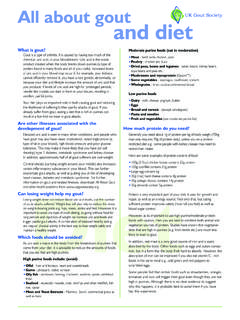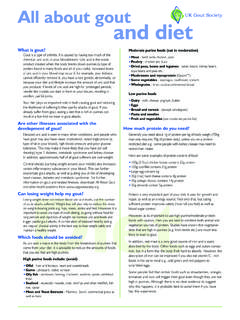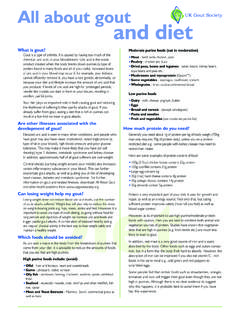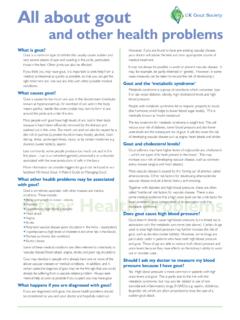Transcription of Final All about gout and treatment 2014 - UK Gout …
1 All about goutand treatmentsTreatmentsGout is a type of arthritis. It results from an excess of uric acid in the blood and tissues of the body, which if present for long enough, can form into needle-like crystals which can inflame your joints and cause severe pain and swelling. If you have gout , it is important to get the right treatment to relieve your suffering as quickly as possible. You will then be able to get on with your everyday life and reduce the likelihood of suffering further painful long does a gout attack normally last?Untreated, a sudden attack usually lasts for one or two weeks. If you have had several untreated attacks, further attacks are likely to last even should you do if you think you have gout ?
2 Visit your GP as soon as possible. Your doctor will be able to check whether you have gout (details of symptoms can be found in our booklet All about gout ), and, if so, prescribe the drug that is most appropriate for you for the relief of pain and swelling. He or she will also be able to give you advice and information about gout . If necessary, lifestyle changes may be recommended, and the doctor will assess whether any other treatment is subsequently required to help prevent further attacks. In certain circumstances your GP may feel it necessary to refer you to a specialist (rheumatologist) for additional investigations or are the main medical treatments available?Medicines to relieve pain and swellingNSAIDs Sudden (acute) attacks of gout are usually treated with non-steroidal anti-inflammatory drugs (NSAIDs).
3 NSAIDs such as diclofenac, naproxen or ibuprofen relieve pain and help to reduce the redness and swelling. They are usually very effective and do not contain steroids. They can, however, sometimes give rise to indigestion or an upset stomach. Rarely NSAIDs can cause stomach ulcers, bleeding and rashes. They can also aggravate asthma, heart and kidney failure and raise blood pressure. However, these more serious side effects are very uncommon with short term use. NSAIDs should be used at the lowest possible dose for as short a duration as possible. Newer NSAIDs called COX-2 selective inhibitors ( coxibs ) are less likely to cause stomach upsets or gastric bleeding, and are therefore sometimes recommended for patients who are at higher risk of suffering an ulcer or bleed, but neither non-selective NSAIDs or coxibs should be taken by people with an active stomach ulcer or with bleeding in the stomach or intestines.
4 Coxibs should be avoided in people with a history of heart problems such as heart attack, heart failure, angina or bypass surgery and all NSAIDs should be used with great care in patients with hypertension, heart and kidney disease. Only one coxib (etoricoxib) is currently approved for treating gout , but it should be avoided in people with high blood pressure which has not been adequately controlled. Although it is an NSAID, aspirin is not recommended for gout as it can actually increase the level of uric acid in your blood. Low doses of aspirin (75mg daily), when prescribed for the prevention of heart attacks, should not increase your uric acid levels significantly, and should be continued.
5 Some NSAIDs (such as ibuprofen) are also available without a prescription from pharmacies and supermarkets. Always tell your doctor if you are taking other medicines as taking too high a dose of NSAIDs can be dangerous. If an NSAID or coxib has been prescribed, treatment should be started as soon as possible after the start of your gout attack and the drug should be continued for a couple of days after symptoms have resolved. Colchicine Colchicine is another medicine which can be used to treat acute attacks of gout . This is a long established remedy made from a plant known as meadow saffron (the autumn crocus). It can be effective, but tends to be used less often than NSAIDs as it can make you feel very sick or give you diarrhoea.
6 Colchicine used to be prescribed an initial dose of two tablets followed by one tablet 3 or 4 times daily until the gout attack settles or diarrhoea becomes troublesome. However, nowadays a dose of 1-2 tablets 2-3 times a day is more commonly used, to reduce the risk of nausea and diarrhoea. Colchicine is usually taken for 3 days, although occasionally a longer course is If an acute attack of gout does not settle with NSAIDs or colchicine, or if stomach problems or kidney disease rule out the use of these drugs, your doctor may prescribe a corticosteroid (cortisone-like) drug. This could be in the form of an injection into the affected joint, an injection into muscle in the upper arm or buttock or a 5 7 day course of oral steroids, usually prednisolone.
7 Side effects with such a short course are usually limited to mild insomnia or flushing but long term treatment with corticosteroids is best avoided as it can result in weight gain, fluid retention, high blood pressure and diabetes, as well as osteoporosis and wasting of the skin and muscles. Corticosteroids such as prednisolone are different from, and should not be confused with, the anabolic steroids that are sometimes misused by athletes to build up muscle bulk and to help prevent further attacks If you have repeated, very painful attacks of gout , and the blood uric acid level remains raised, you are likely to be prescribed a drug which will lower the level of uric acid in your blood.
8 These have to be taken continuously every day after your attack of gout has settled. The doctor will adjust the dose of the drug to maintain the blood uric acid level below (5mg/dl). These preventive medicines can either reduce the production of uric acid in the body or increase its removal from the body through the kidneys in your that reduce urate formation The drug most commonly prescribed to lower blood levels of uric acid, by reducing its formation, is allopurinol which is available under several brand names. Doctors sometimes advise delaying the start of treatment for at least a week after the attack has settled because allopurinol and other uric acid lowering drugs may actually make a gout attack last longer, or trigger acute attacks ( flares or breakthrough attacks) in the early phase of treatment .
9 To reduce the risk of such acute flares of gout it is good practice to prescribe a small dose of colchicine (one tablet twice daily), or an NSAID, for 3-6 months after starting treatment with Treatmentsallopurinol, or other uric acid-lowering drugs. Your doctor will discuss the relative risks and benefits of taking NSAIDs in this way. They are more likely to use naproxen rather than diclofenac in this situation but may also prescribe a drug to reduce the risk of a stomach ulcer developing, such as omeprazole. Allopurinol is usually started in a small dose of 100mg daily and this is then gradually increased as instructed by your doctor. Doses of more than 300mg a day are seldom prescribed although doses as high as 800 or 900mg daily are sometimes needed to lower the blood urate to optimal levels.
10 However, people with poorly functioning kidneys, whatever the cause, should receive a reduced dose. Skin rashes are a troublesome complication in less than 5% of gout patients. Rarely, however, these can be serious and severe, so it is advisable to consult your GP if a rash develops. Febuxostat is a newer drug used for the treatment of patients with gout who are unable to tolerate allopurinol, or who have failed to respond adequately to optimal doses. It acts in a similar way to allopurinol, but may be more powerful at reducing uric acid levels, and may be more suitable for those with poor renal (kidney) function. However, it is unsuitable for patients with ischaemic heart disease such as drugs These lower the level of uric acid in the blood and help you to rid the body of excess uric acid by increasing its removal by the is the only uricosuric drug generally available in the UK at present.



